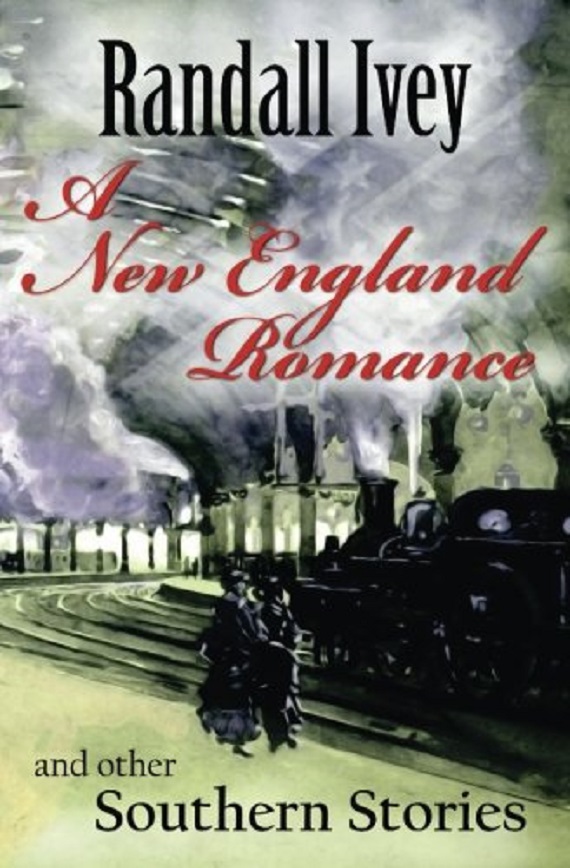A review of A New England Romance: And Other Southern Stories by Randall Ivey (Shotwell Press, 2016).
Randall Ivey’s book of Southern stories will make you laugh, cry and nod your head in recognition of delightful characters you feel you have known forever, or at least most of your life. This is especially true if you are lucky enough to be a Southerner. Open the book and as you begin reading you won’t want to stop. Every story in this volume compels page turning and more reading. It is an enchanting collection of fine Southern writing.
Allow me to introduce you to Mr. Ivey’s work with a snippet from the first tale. Two friends are eyeing a beautiful wedding gown that has grown dusty and unused in a hidden place. Doreen wants her friend Georgina to enlighten her about the past life of the wedding dress. The sad, lacey, unloved dress they held in the air between them was beautiful. She wants the true story and not the local gossip, which we all know is wrong.
Georgina begins,
“But I want to make one thing perfectly clear to you before I begin: my cousin was not and is not crazy. No, no. She was a victim of that snub-nosed, stump-limbed little demon that catches hold of all of us at one time or another.”
“Love, you mean,” Doreen filled in and continued watching her friend on the verge of the story. Georgina glared again. “Well,” Doreen explained, “that’s how Jesse McMillan says you start this thing, by talking about how cruel and harmful love can be and how we have all experienced its heartbreaks.”
The conversation goes on to highlight how the young cousin who would be the bride who wasn’t the bride had her life ruined by reading too many “fanciful” books about people and things that could not be. Reading too much, you see, would bring on these wrong ideas about love and life and whatever pleases your fancy. And all that fanciful thinking would blind you to reality. Which is exactly how the bride ended up stranded.
Mr. Ivey has managed to remind us of all the manners and mores of bygone days while presenting the settings of the present and then he stands back to allow us to witness the upheaval of the inevitable clash. Wry humor about the human condition, dark passages that evoke our empathy, quirky and lovable characters, all the foibles and glory of ordinary people in the messes of life. Life and love are so very messy and this talented writer deftly handles it all and makes us glad to join him in watching his portrayal of his characters.
There were countless scenes that caused me to laugh endlessly. How in the world, I often thought, did he know some of the same kinds of people I have known? I recognized the kindness and the shenanigans of my own kin, as well as some of the people I’ve met. You probably know them as well because people are pretty much the same everywhere. Except the South appears to have a higher share of interesting and, shall we say, eccentric folk. All to the good, as Ivey shows us.
Ivey draws his characters into situations that reveal their inner life with compassion for them while keeping them true to their personalities. His people aren’t precious for the sake of making a point. Ivey’s words and characterizations are much more honest. Yet, all those words never mock or condemn the people. We can feel for the hardships or silliness or awful behavior of characters without dismissing them.
Honestly, this book doesn’t read like fiction, at least in the sense of feeling contrived. This delicious book almost feels like eavesdropping on private conversations about events. It reminds me of reading historical letters between families or friends. One person sharing life’s joys and heartache with someone else who is loved and trusted. The people and the stories have a timeless quality because they feel real and not trendy. Many of today’s authors will have works that grow stale with time. Mr. Ivey’s work will not fall into that category. The quality and sincerity will endure long after we are all gone.
With a superb, easy to read writing style and unforgettable characters, Mr. Ivey gives us endearing tales that are a delight to read, while planting some lessons without a heavy hand. These are the types of stories we want our children and grandchildren to read. They capture the unique flavor of life below the Mason Dixon line with love and insightful observations. It is refreshing to read good writing and literature that doesn’t denigrate traditional ideals about how to love and treat people.
Your mama or mamaw told you to be kind to people, love them where they are, and help when you can. They reminded you that most people are trying to do the best they can in difficult circumstances. All those sentiments waft through these stories and leave a lingering fragrance of delight behind. You’ll be glad you bought this book. Happy reading!







